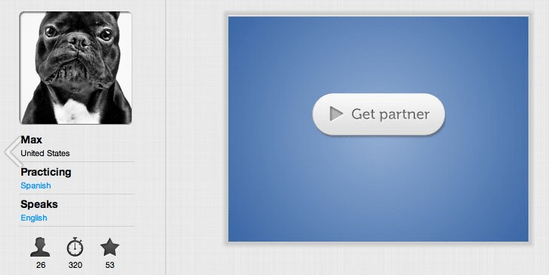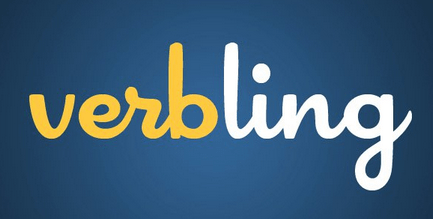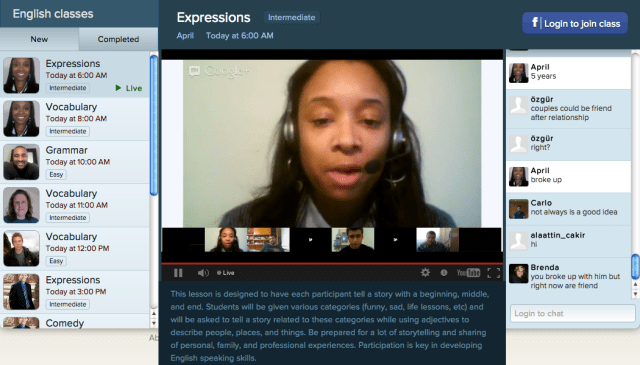Learning a new language can be tedious and frustrating. Thankfully, a new generation of startups are leveraging advances in mobile and web technologies to make that process more enjoyable and rewarding. Today, companies like Livemocha, PlaySay, Voxy, italki, MindSnacks and Duolingo provide increasingly viable alternatives to traditional language-learning software — the Rosetta Stones of the world.
Another recent entrant into the space is Y Combinator grad Verbling, a venture-backed startup that wants to help turn language learners into polyglots by using video chat to connect them with real, live native speakers. Unlike the text-focused and algorithm-based Duolingo, Verbling wants to help users reach fluency and avoid the drop-out bug by creating a frictionless, in-browser live video chat experience that encourages immersion — albeit a virtual one.
After joining, the startup automatically pairs people that want to learn Spanish and are fluent in English, for example, with the opposite — those who are fluent in Spanish and want to learn English. It’s immersion via reciprocity. Users are matched by their experience levels and are encouraged to switch back and forth between languages (by an accompanying timer), with the system suggesting various prompts and targets along the way.
Since launching earlier this year, Verbling has focused exclusively on English and Spanish, but today the company is adding support for nine new languages, including Italian, French, German, Mandarin, Japanese, Hebrew, Portuguese, Arabic, and Russian, bringing the total to eleven. Founder Mikael Bernstein told us that these have been the most-requested languages from its users and, really, they represent the most-commonly spoken languages in the world.
 Its new support for 11 languages puts the startup in good stead compared to Duolingo, Voxy and MindSnacks and puts it on par with the site that it probably most closely resembles — Busuu. A number of sites offer some kind of tool for connecting with native speakers, including courses and lessons on top of that. Bernstein believes Verbling has an advantage in this regard because its been laser-focused on its novice-to-expert matching and one-to-one video model.
Its new support for 11 languages puts the startup in good stead compared to Duolingo, Voxy and MindSnacks and puts it on par with the site that it probably most closely resembles — Busuu. A number of sites offer some kind of tool for connecting with native speakers, including courses and lessons on top of that. Bernstein believes Verbling has an advantage in this regard because its been laser-focused on its novice-to-expert matching and one-to-one video model.
The co-founder tells us that users are now participating in over 50,000 practice sessions per month and that sessions saw 317 percent month-over-month growth in November, which he expects will compound with the launch of its new language support. On tap of that, with sessions increasing, Verbling is also launching its own classes.
But it’s doing so by sticking to its video-chat roots, as “Verbling Classes” offer nine language students the ability to join Google Hangout-powered classes led by an official, TEFL-certified Verbling teacher. Bernstein says that, they were initially skeptical of using Hangouts, but after Google reached out to propose the solution, they considered it more seriously as a valid way to replicate a classroom setting. Something he says that can provide a virtual classroom experience that’s more fun and conversation-based and one that could become a future monetization vehicle.
For its main one-to-one video chat experience, Verbling tries to improve stickiness by allowing users to stay in touch with a chat mate if they enjoyed the conversation and found it productive. Learning a new language is definitely aided by adding a little constancy and familiarity, so being able to send a friend request via the platform, message each other (or just do a voice call if video seems awkward) is a great way to encourage users to build working professional relationships and pick up where they left off.
At first, the startup will only be hosting its Google Hangout language classes in English, which will be limited to nine-per-class but will be hosted on a range of subjects. Nine will get to directly participate, but even if you don’t make it, you can still listen in and actively participate. Going forward, Bernstein says that the startup wants to be able to allow students to pay a small fee to guarantee their spot in one of its classes.
Going forward, Verbling will be focused on building out both its class and one-to-one learning experiences and will be raising an additional round of funding to support this growth. The startup $1 million from DFJ, Learn Capital, Start Fund, Inspovation Ventures, SV Angel, Meck Investments, Ace & Company and others, back in January. The co-fouder also tells us that Verbling recently added Gustav Rydstedt as its new CTO, who was formerly the team manager at Blizzard on Diablo 3 and hired T20-under-20 finalist and YC alumnus and FamilyLeaf co-founder Brandon Paton.

